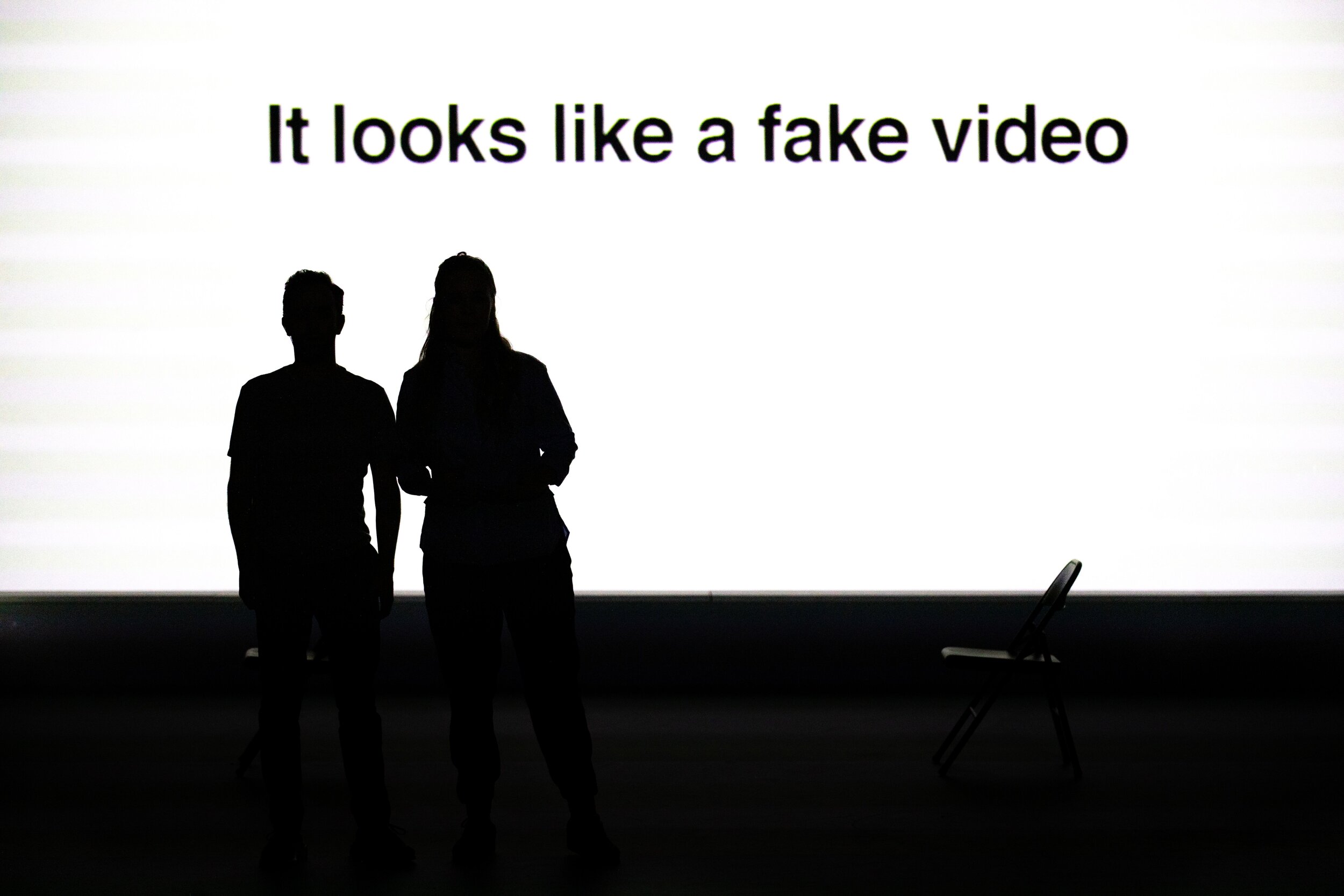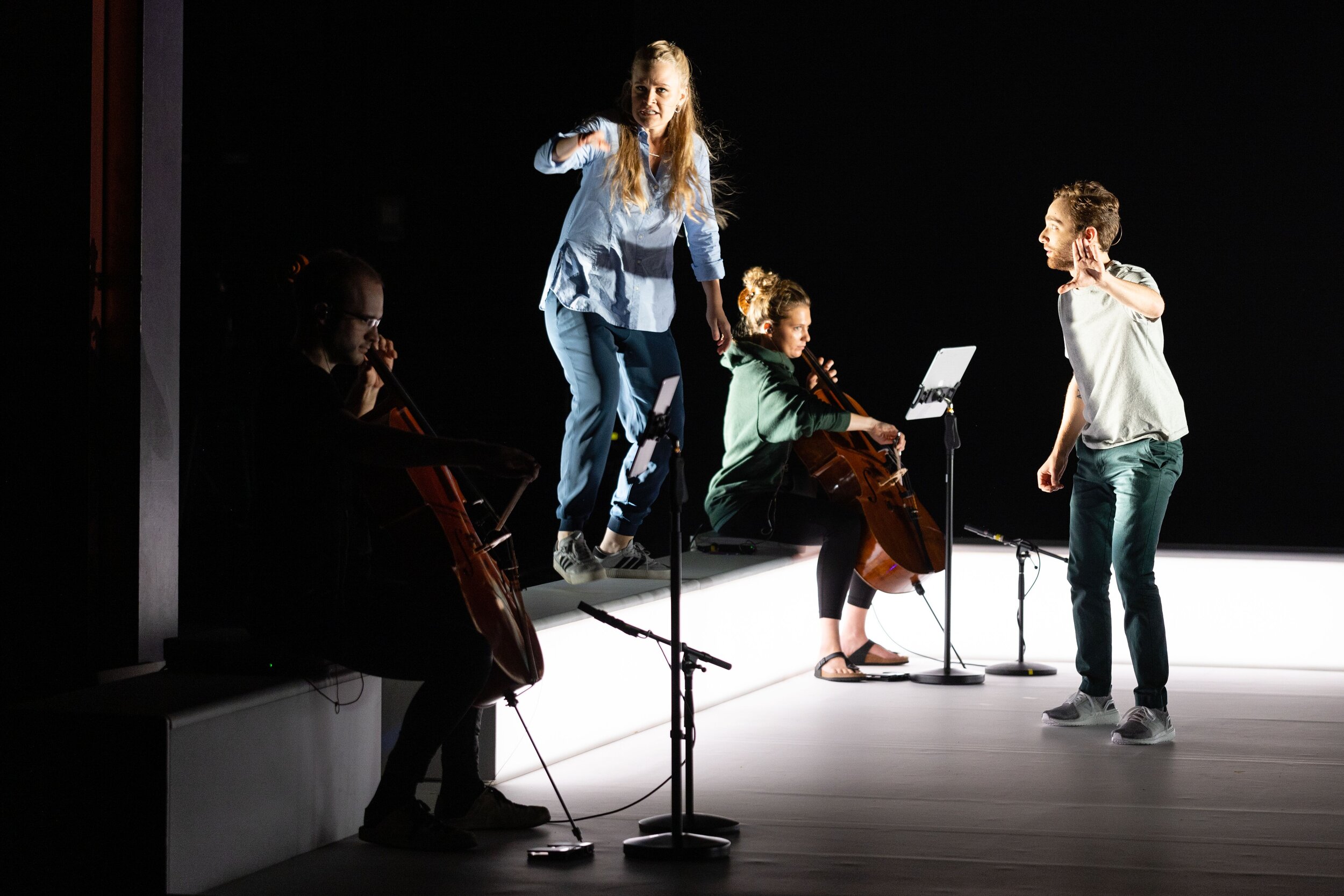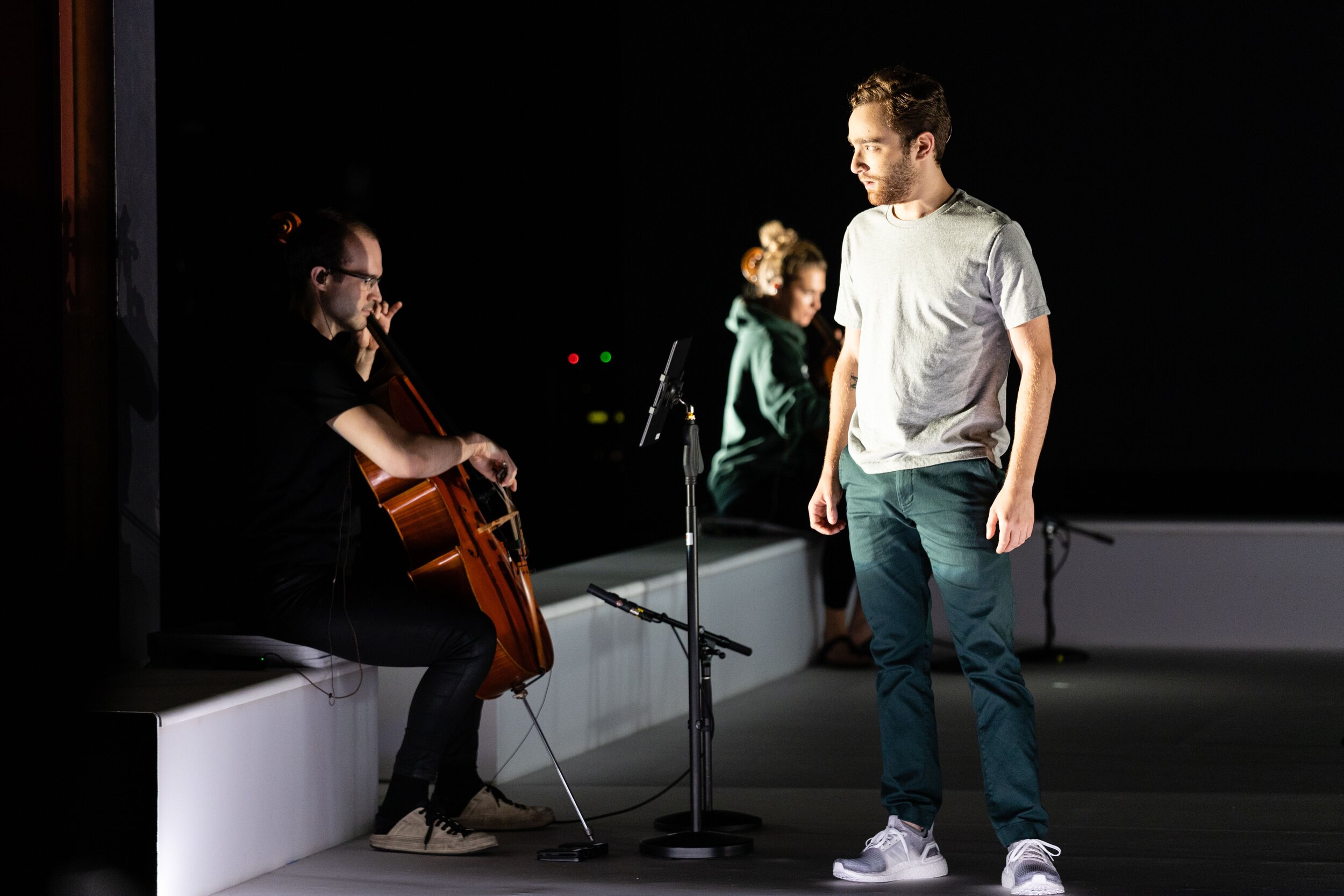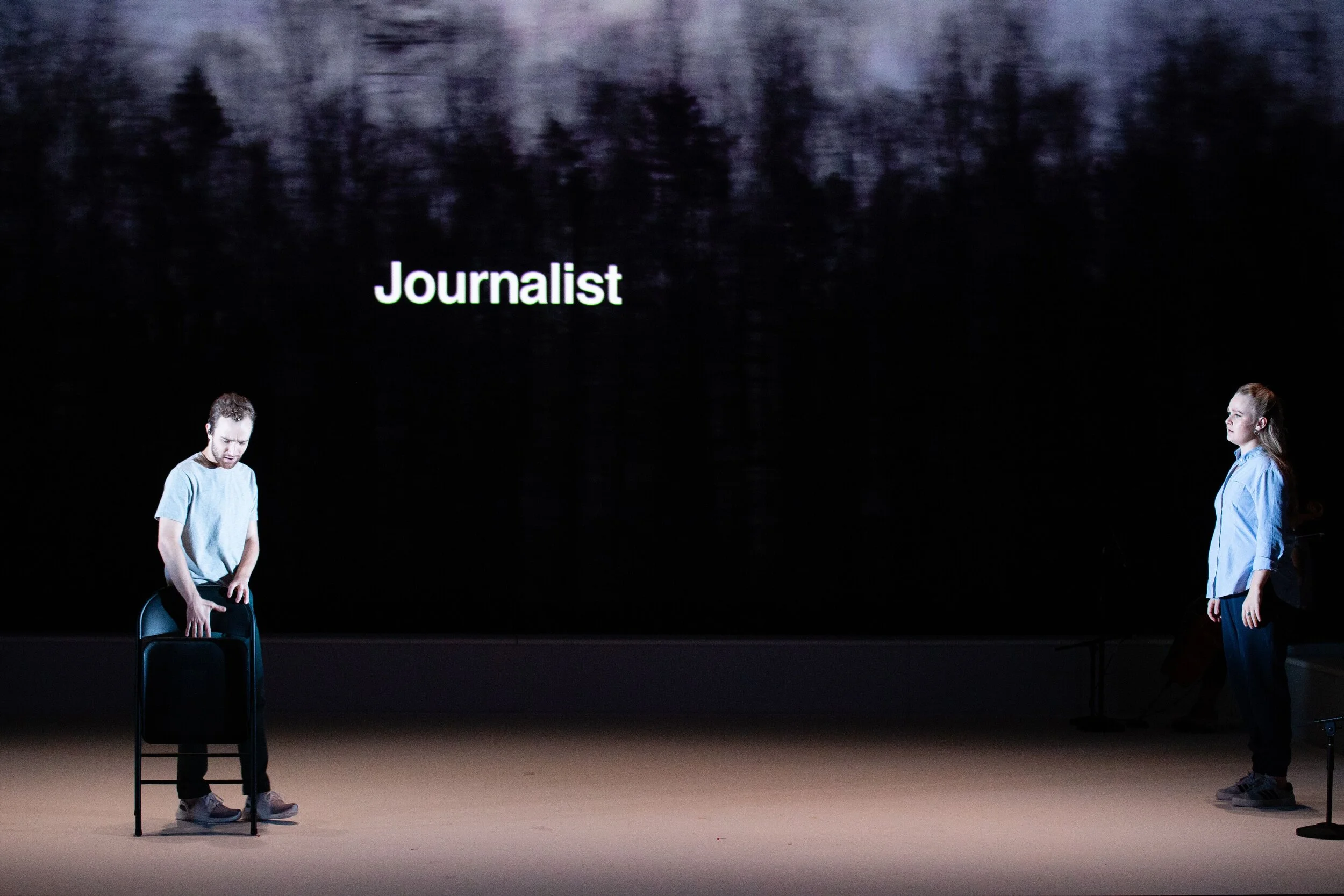What a fake news headline! This news in this new opera isn’t breaking. I mean the story of Denis and Katya is like sooooo yesterday, IMHO. Why would we want to spend our time on news from 2016 for God’s sake. That’s ancient history. I mean get online and get with the times already. There are thousands of stories happening right now and we can watch and even talk to the actors, I mean people involved. Denis and Katya were jerks, though it was fun to watch them thumb their noses at everybody. But let’s move on. I do wish she had showed us her tits.
The world premiere of Denis & Katya presents the story of a real-life event…really. Photo by Dominic M. Mercier; courtesy of Opera Philadelphia.
Disturbing paragraph, right? I’ve been thinking about Opera Philadelphia’s “new opera” entry into Festival O19. It’s titled Denis & Katya. Its composer is Philip Venables and the librettist is Ted Huffman. For some odd reason, as I thought about it this morning, I found myself in voyeur space, not involved with the story, just viewing it in my head and becoming a heckler. How might a voyeur write about this opera, seeing the characters as objects in a computer game? I drew my deliberately provocative first paragraph above from themes in the opera itself. The shocking last line is from a comment sent to Katya as she streamed their standoff with Russian police and special forces on the worldwide internet using her cellphone, just before she and her friend and fellow high schooler Denis died. They built a large audience, a popular but brief show on the internet. Some online watchers even sent comments that they should kill themselves, that that was what they deserved. I don’t know if the comments were all taunting ones; I don’t recall seeing any in the opera that offered any sympathy or comfort or assurance they could get through this if they turned themselves in. The opera only reported the police as telling them to put down their weapons and come out. The opera uses verbatim text.
Theo Hoffman and Siena Licht Miller each play all six characters. Photo by Dominic M. Mercier; courtesy of Opera Philadelphia.
The composer and librettist picked up on their story from a news feed and became increasingly drawn to it. Opera Philadelphia gave them the opportunity to turn it into what became a 70-minute chamber opera. Denis and Katya, two Russian, apparently normal 16-year-olds, became friends. After a row with their families, they headed to a relative’s cabin in a small Russian village where they found alcohol and guns and ammunition. They began a standoff against family, friends, and authorities. They posted photos, and much of what they did from inside the cabin they streamed using Periscope, an online streaming service. They shot the cabin’s television to perform for their online audience, shot out a neighbor’s window recklessly, and shot up a police van dangerously with guns and bullets, and shot Katya’s mother in the hip with an air-pistol. Eventually, the police stormed the cabin and brought out the two teenagers dead from bullet wounds. Some thought the girl was a hostage. How they died apparently depends on what you prefer to believe: did they commit suicide or did the police kill them? In researching the story, Mr. Venables and Mr. Huffman traveled to Russia and spoke with several of those involved. Ksenia Ravvina is a co-creator and translator for the production.
The Journalist portrayed by Theo Hoffman and Siena Licht Miller has a moment on stage accompanied by four cellos. Photo by Dominic M. Mercier; courtesy of Opera Philadelphia.
What was the story here that the composer and librettist wanted to tell? With what they had to go on, I think they chose correctly to focus on the developing story as a revelatory event in time that came and went, not on Denis and Katya themselves. To avoid any appearance of being disrespectful, Denis and Katya are not characters in the opera; they are talked about, but not present. The events are related by two singers, a mezzo-soprano and a baritone, who play six different roles from among those who witnessed the event – journalist, friend, neighbor, teenager, teacher, and medic. Each role is played by both singers with different singing and speaking parts, and texting between the composer and librettist is displayed on a screen as the opera progresses. Mr. Venables has called it role-play theater. Electronic, digital sounds and video footage as well as lighting effects were used to enhance the story telling. It is told as a docu-opera. The singers were dressed in clothes as you might see them in the mall. It offers something new to the realm of how opera can tell a story.
Theo Hoffman and Siena Licht Miller move about in playing the roles. Photo by Dominic M. Mercier; courtesy of Opera Philadelphia.
The singers in Saturday’s matinee were mezzo-soprano Siena Licht Miller and baritone Theo Hoffman, two excellent young performers with strong, beautiful voices. The acting and singing of both enhanced my enjoyment of the opera, though I never quite got comfortable with the male-female role switching for the same character. I was, however, highly impressed with their ability for rapid fire switching between characters and immediately displaying the moods/temperaments of the next character. Their voices conveyed the emotion that reporting does not, the crux I suspect of why this story was told as an opera.
Mr. Venables’ choice for the music was four cellos, placing one each in the four corners of the stage, cellos because of the moods they evoke and their placement to add drama as they played individually or in combinations and four because he wanted the opera to be an easy one to take on tour. It reminded me of the dramatic impact of a single cello passage in the aria “La momma morta” from the opera Andrea Chenier. There is different music for the different characters. My wife thought composer Venables deserved kudos for the progression of the music, especially towards the end. Mr. Venables’ strategy works and the music is supportive of the drama and is also engaging to the ear. Also kudos to Emily Senturia, who directed the cellists.
Shapes and footage as well as text appear on the screens. Photo by Dominic M. Mercier; courtesy of Opera Philadelphia.
Since the opera, I still wonder what actually happened and what role the internet audience played. Why did Denis and Katya want their story streamed? What role did knowing that they were being watched play in the way events unfolded? What influence did the commenters have on them and on the authorities? (Suppose Hannibal Lechter was commenting on Twitter or a streaming service even when he was out of sight: Clarice, why didn’t your mother love you?) I saw a comment the other day that pointed to the scary realization that the worst of us are now connected with the best of us. Some commenters wanted to know if it was all fake. If Denis and Katya thought that an audience might come to their rescue, they could not have been more wrong. There was no resolution in the opera beyond death and an ending of the story, and that is still unsatisfying and unsettling. Two teenagers died and we don’t quite know why. The day after their deaths the audience moved on. The opera left me sad with the feeling that something had come into modern life that is exerting control over us in a highly impersonal way that we don’t yet understand.
A text exchange between the composer Philip Venables and the librettist Ted Huffman. Photo by Dominic M. Mercier; courtesy of Opera Philadelphia.
Denis & Katya is a hard hitting drama and an outstanding work of art, but let’s place it in a bit of context. If you only want to hear beautiful melodies and harmonies in arias you will want to listen to again and again, this one is not for you. It is a small opera in terms of time and scope and ensemble size. It’s emotional impact is powerful and lingering, but experienced as a story being told; I personally want to see Act II where we meet Denis and Katya. Nonetheless, the tale of Denis and Katya is gripping and the telling of it is inventive and effective, and the music works. Perhaps most importantly, It speaks to our time, the internet age, a period in human history not just fashionably different, but fundamentally different, in ways we don’t fully comprehend. To me, this was a different story, more about its audience really, told in a new way, opera helping us to come to grips with this new age. it is another strong component of Festival O19, and it will stay with you long past your exit from the theater. I am thinking of it as verismo opera for the twenty-first century, and in that way, it is breaking news.
The Fan Experience: Festival O19, five different productions over twelve days, continues through September 29; performances of Denis&Katya continue through September 29 and tickets are available, but check the website to ensure the singers you wish to see are performing on the date you wish to attend. Ms. Miller and Mr. Hoffman rotate performances with mezzo-soprano Emily Edmonds and baritone Johnny Herford. Also check OP’s website carefully for What’s On; the performances are often accompanied by special events, lectures and meetings with those involved. For example, Denis & Katya did not have a pre-opera talk, but there was a post-opera talk-back. Performances are held in the Suzanne Roberts Theatre, a cozy venue where all the seats are close enough to suit me, but seats way to the side might have a limited view of one of the cello players. Guest services at 215-732-8400 can answer any questions.
This report is part III; part l on Semele and part ll on The Love of Three Oranges preceded this one. I have one more event on my schedule for reports.
Philadelphia is a great city to visit for food, historical sights, and the arts.







